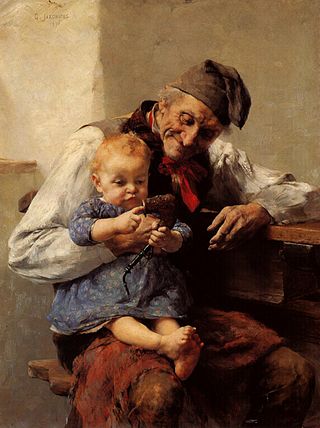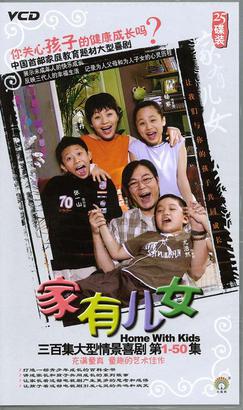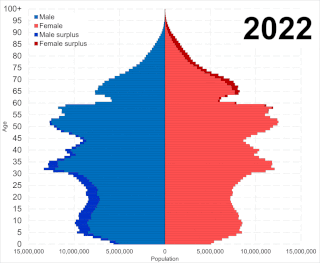
The one-child policy was a population planning initiative in China implemented between 1979 and 2015 to curb the country's population growth by restricting many families to a single child. The program had wide-ranging social, cultural, economic, and demographic effects, although the contribution of one-child restrictions to the broader program has been the subject of controversy. Its efficacy in reducing birth rates and defensibility from a human rights perspective have been subjects of controversy.

Grandparents, individually known as grandmother and grandfather, are the parents of a person's father or mother – paternal or maternal. Every sexually reproducing living organism who is not a genetic chimera has a maximum of four genetic grandparents, eight genetic great-grandparents, sixteen genetic great-great-grandparents, thirty-two genetic great-great-great-grandparents, sixty-four genetic great-great-great-great grandparents, etc. In the history of modern humanity, around 30,000 years ago, the number of modern humans who lived to be a grandparent increased. It is not known for certain what spurred this increase in longevity, but it is generally believed that a key consequence of three generations being alive together was the preservation of information which could otherwise have been lost; an example of this important information might have been where to find water in times of drought.

Filial piety is the virtue of exhibiting love and respect for one's parents, elders, and ancestors, particularly within the context of Confucian, Chinese Buddhist, and Daoist ethics. The Confucian Classic of Filial Piety, thought to be written around the late Warring States-Qin-Han period, has historically been the authoritative source on the Confucian tenet of filial piety. The book—a purported dialogue between Confucius and his student Zengzi—is about how to set up a good society using the principle of filial piety. Filial piety is central to Confucian role ethics.

In the United States, a military brat is the child of a parent(s), adopted parent(s), or legal guardian(s) serving full-time in the United States Armed Forces, whether current or former. The term military brat can also refer to the subculture and lifestyle of such families.
An only child is a person with no siblings, by birth or adoption.

A double burden is the workload of people who work to earn money, but who are also responsible for significant amounts of unpaid domestic labor. This phenomenon is also known as the Second Shift as in Arlie Hochschild's book of the same name. In couples where both partners have paid jobs, women often spend significantly more time than men on household chores and caring work, such as childrearing or caring for sick family members. This outcome is determined in large part by traditional gender roles that have been accepted by society over time. Labor market constraints also play a role in determining who does the bulk of unpaid work.
There is considerable confusion in both Chinese and foreign sources over definitions of urban places and hence considerable variation in estimates of China's urban population.

Home with Kids, is a sitcom/drama from Mainland China. There are 4 seasons of Home with Kids, i.e. Home with Kids 1, Home with Kids 2, Home with Kids 3 and Home with Kids 4, which were released respectively in 2004, 2005, 2006 and 2007. It is considered to be an equivalent to Growing Pains and Fresh Off The Boat, both a US sitcom. Unlike most Chinese multi-camera sitcoms, Home With Kids prominently uses child actors as main roles. As a spiritual successor of China's first multi-camera sitcom, I Love My Family, the series also reunites Song Dandan and Wen Xingyu.
A two-child policy is a government-imposed limit of two children allowed per family or the payment of government subsidies only to the first two children.
The Post-'80s is a Chinese colloquial term referring to the generation in Mainland China born between 1980 and 1989, especially in urban cities, after the introduction of the one-child policy. It is the Chinese counterpart to the early Generation Y in the Western World, the first post-Cultural Revolution generation, and the first to grow up entirely within the Reform era. The Post-80s currently ranges from age 34 to 44, making up a major portion of China's working young adult demographic.

Marriage in China has undergone change during the country's economic reform period, especially as a result of new legal policies such as the New Marriage Law of 1950 and the family planning policy in place from 1979 to 2015. The major transformation in the twentieth century is characterized by the change from traditional structures for Chinese marriage, such as arranged marriage, to one where the freedom to choose one’s partner is generally respected. However, both parental and cultural pressures are still placed on many individuals, especially women, to choose socially and economically advantageous marriage partners. In 2023, China had 7.68 million marriages. While divorce remains rare in China, the 1.96 million couples applying for divorce in 2010 represented a rate 14% higher than the year before and doubled from ten years ago. Despite this rising divorce rate, marriage is still thought of as a natural part of the life course and as a responsibility of good citizenship in China.

China's family planning policies have included specific birth quotas as well as harsh enforcement of such quotas. Together, these elements constitute the population planning program of the People's Republic of China. China's program should not be confused with the family planning programs instituted in other countries, which were designed to encourage parents to have the number of children they desired—in China, the provision of contraception through family planning programs was subservient to a birth planning program under which the government designated how many births parents could have in order to control the size of its population.
Princess sickness, alternatively known as princess complex, princess syndrome or princess disease, is a neologism used colloquially in East and Southeast Asia to describe a condition of narcissism and materialism in women, or "princess" behaviour. Conversely but less commonly, men with a similar outlook may be described as having "prince" sickness.
"Hong Kong Kids" or "Kong Kids" is a derogatory term that refers to a stereotype of children or teenagers in Hong Kong who are said to be overly dependent on their families, have low emotional intelligence and lack self-management skills. The term was coined in 2009 in a book titled Kong Kids: The Nightmares for Parents and Teachers published by the Ming Pao newspaper. The stereotype is reinforced by anecdotal evidence from the media, but has no scientific literature to speak of.
For years, the census data in China has recorded a significant imbalance sex ratio toward the male population, meaning there are fewer women than men. This phenomenon is sometimes referred to as the missing women or missing girls of China. China's official census report from 2000 shows that there were 117 boys for every 100 girls. The sex imbalance in some rural areas is even higher, at 130 boys to 100 girls, compared to a global average of 105 or 106 boys to 100 girls. In 2021, the male-to-female ratio of China is recorded at 104.61 to 100.
Child abuse in China is not clearly defined by the Chinese legal code.
Son preference in China is a gender preference issue underpinned by the belief that boys have more value than girls. In China, the bias towards male over female offspring is demonstrated by the sex ratio at birth (SRB).

China's population is aging faster than almost all other countries in modern history. In 2050, the proportion of Chinese over retirement age will become 39 percent of the total population according to projections. China is rapidly aging at an earlier stage of its development than other countries. Current demographic trends could hinder economic growth and create challenging social issues in China.

In South Korea, aging refers to an increase in the proportion of senior citizens to the total population. The term "senior citizens" include those aged 65 or older. According to Article 3 no.1 of the Framework Act on Low Birthrate of an Aging Society, the term "aging population" refers to the increasing proportion of elderly people in the entire population.

The three-child policy, whereby a couple can have three children, is a family planning policy in the People's Republic of China. The policy was announced on 31 May 2021 at a meeting of the Politburo of the Chinese Communist Party (CCP), chaired by CCP General Secretary Xi Jinping, on population aging.










